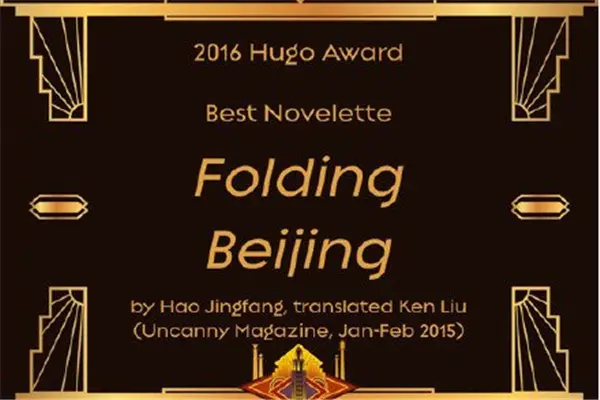On Sunday, a second Chinese author received the prestigious Hugo Award for science fiction, this time in the category of best novelette.
Hao Jingfang, author of "Folding Beijing," won the award at the 74th World Science Fiction Convention in the United States following Liu Cixin's 2015 Best Novel award for "The Three-Body Problem," the first part of a trilogy.
Established in 1953, the Hugo Awards acknowledge the best works of science fiction or fantasy and, along with the Nebula Awards, are seen as the top prizes in the genre. They are named after Hugo Gernsback, founder of the American science fiction magazine "Amazing Stories." The best novelette prize has previously been won by such acknowledged greats as Isaac Asimov, Ursula K. Le Guin and George R.R. Martin.
File Photo
News was received with great delight at the ongoing Shanghai Book Fair.
UNFOLDING OPPORTUNITIES
"Folding Beijing" tells of a father's struggle to send his daughter to school in the Beijing of the future, alluding to the difficulties that some Chinese parents face today to ensure their children receive a quality education. Hao herself graduated in physics from Tsinghua University in 2006.
Chinese author Hao Jingfang wins the 2016 Hugo Award for Best Novelette with her novel, "Folding Beijing." Photo By: Agencies
"Chinese sci-fi is embracing unprecedented opportunities today," said Liu Cixin at the Shanghai fair. Liu believes China is witnessing the beginning of sci-fi "industrialization" and the environment for sci-fi writers has greatly improved from previous decades.
"Death's End," the third part of Liu's trilogy is to be released in the United States Sept. 20. The English translation of the entire trilogy made its debut at the Shanghai Book Fair on Sunday. "The Three-Body Problem" has already been adapted for both stage and the big screen.
"Following the success of 'The Three-Body Problem,' we noticed an increase in Chinese material in sci-fi all round the world," said Yao Haijun, chief editor of "Science Fiction World," China's leading sci-fi magazine. "It may also perhaps be associated with the rise of the Chinese economy in general," Yao said.
CHINA: THE FINAL FRONTIER?
"The Three-Body Problem" has sold more than 160,000 copies since it was published in November 2014, and has been reviewed in the "New York Times" and "Wall Street Journal."
As to why the work has been so widely welcomed in the West, Yao Haijun believes the excellence of the translation is a major factor. "It has also set up a link between China and the West, through which foreign readers can attempt to hypothesize about the future of the country," he said.
The Three-Body Problem byLiuCixin. File Photo
His view is shared by Liu himself. "Science fiction is becoming a key to the world's understanding of China," he said.
In China, demand for sci-fi is on the rise. Audiences have become interested in sci-fi movies, and many high-profile figures from beyond the literary world -- Li Yanhong, head of Internet giant Baidu, and Lei Jun, co-founder of smart phone maker Xiaomi -- have heaped praise on Liu's work.
Despite these accolades and a certain amount of financial success, sci-fi in China is still in its infancy and in dire need of a nurturing system.
Liu recalls attending a writers' conference in the United States. "Before stepping in the room, I thought it was a round table meeting with twenty plus people," he said. When the door opened, Liu was shocked to see thousands of participants.
In contrast, Chinese sci-fi fans struggle to name even 30 domestic sci-fi writers, among whom less than 10 are making a living from their craft. "We need to create an environment which allows more writers to develop their talent and the genre to prosper," Liu said.
THE SHAPE OF THINGS TO COME
To increase the number of sci-fi writers in China, Beijing's Future Affairs Administration, a startup which mainly deals with sci-fi copyright business plans an incubator for sci-fi talent.
"How to attract the young generation is the biggest challenge for sci-fi," said British sci-fi writer Ian McDonald at the Shanghai Book Fair.
Liu echoed his views, suggesting that it will be increasingly difficult for sci-fi writers to write satisfying works in an era when people have instant access to the latest developments in technology, such as the Five-hundred-meter Aperture Spherical radio Telescope, or "FAST", dark-matter detection satellites, and so on.
At the same time, however, Liu sees a new opportunity in every development. "New technology would provide a knowledge foundation for writers," he said.
(APD)
 简体中文
简体中文



